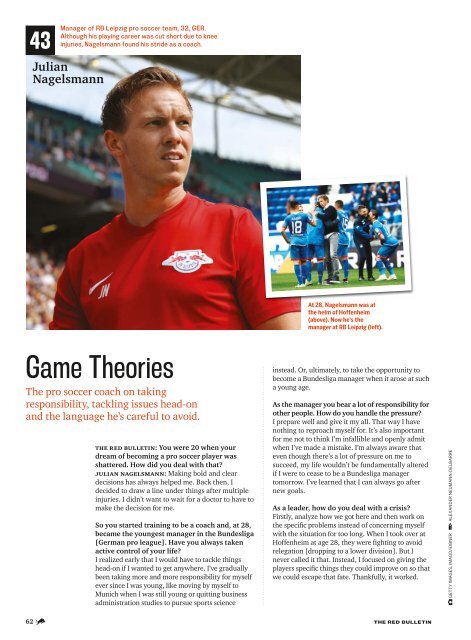Create successful ePaper yourself
Turn your PDF publications into a flip-book with our unique Google optimized e-Paper software.
43<br />
Manager of RB Leipzig pro soccer team, 32, GER.<br />
Although his playing career was cut short due to knee<br />
injuries, Nagelsmann found his stride as a coach.<br />
Julian<br />
Nagelsmann<br />
At 28, Nagelsmann was at<br />
the helm of Hoffenheim<br />
(above). Now he’s the<br />
manager at RB Leipzig (left).<br />
Game <strong>The</strong>ories<br />
<strong>The</strong> pro soccer coach on taking<br />
responsibility, tackling issues head-on<br />
and the language he’s careful to avoid.<br />
the red bulletin: You were 20 when your<br />
dream of becoming a pro soccer player was<br />
shattered. How did you deal with that?<br />
julian nagelsmann: Making bold and clear<br />
decisions has always helped me. Back then, I<br />
decided to draw a line under things after multiple<br />
injuries. I didn’t want to wait for a doctor to have to<br />
make the decision for me.<br />
So you started training to be a coach and, at 28,<br />
became the youngest manager in the Bundesliga<br />
[German pro league]. Have you always taken<br />
active control of your life?<br />
I realized early that I would have to tackle things<br />
head-on if I wanted to get anywhere. I’ve gradually<br />
been taking more and more responsibility for myself<br />
ever since I was young, like moving by myself to<br />
Munich when I was still young or quitting business<br />
administration studies to pursue sports science<br />
instead. Or, ultimately, to take the opportunity to<br />
become a Bundesliga manager when it arose at such<br />
a young age.<br />
As the manager you bear a lot of responsibility for<br />
other people. How do you handle the pressure?<br />
I prepare well and give it my all. That way I have<br />
nothing to reproach myself for. It’s also important<br />
for me not to think I’m infallible and openly admit<br />
when I’ve made a mistake. I’m always aware that<br />
even though there’s a lot of pressure on me to<br />
succeed, my life wouldn’t be fundamentally altered<br />
if I were to cease to be a Bundesliga manager<br />
tomorrow. I’ve learned that I can always go after<br />
new goals.<br />
As a leader, how do you deal with a crisis?<br />
Firstly, analyze how we got here and then work on<br />
the specific problems instead of concerning myself<br />
with the situation for too long. When I took over at<br />
Hoffenheim at age 28, they were fighting to avoid<br />
relegation [dropping to a lower division]. But I<br />
never called it that. Instead, I focused on giving the<br />
players specific things they could improve on so that<br />
we could escape that fate. Thankfully, it worked.<br />
GETTY IMAGES, IMAGO/EIBNER ALEXANDER NEUMANN-DELBARRE<br />
62 THE RED BULLETIN

















